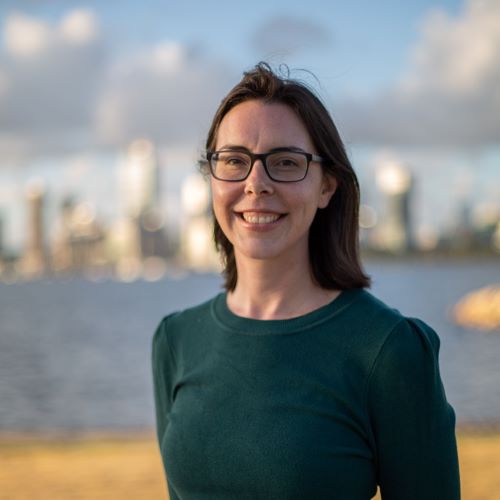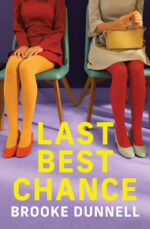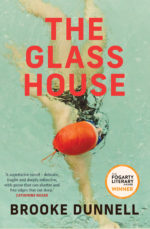Brooke Dunnell’s done it again with a second thought-provoking, boundary-busting novel, this time covering the tricky terrain of greenwashing and fertility

With her prize money, Fogarty Literary Award winner Brooke Dunnell travelled to Eastern Europe to research her second novel, Last Best Chance. Just as her debut, The Glass House, was a work of exquisite tension and ambiguity, Brooke says she wanted Last Best Chance to embrace uncertainty, with characters dealing with multiple moral complexities and who struggle to find their feet on foreign soil. We joined Brooke to hear more about the back story to her new novel.
What was the inspiration behind Last Best Chance?
The idea of writing a story about a woman undergoing fertility treatment overseas had been on my mind ever since I came across online forums where women, mostly from the United States, travelled to Prague or Brno for more affordable IVF. It occurred to me that an IVF cycle follows the same arc as a conventional narrative, with the tension rising as patients come closer to finding out if they’ve achieved a pregnancy. Having also been to various cities in Central and Eastern Europe, I was keen on using this setting to explore the effects of a patient being far from home, unable to speak the local language and confused as to the customs of the place where they’re undergoing such a massive life experience.
I originally wrote the story as a novella that just followed the character undergoing fertility treatment, but that version was more conceptual and the stakes weren’t as high as they are in Last Best Chance. Later it occurred to me to expand the story by adding a second protagonist who’s also a foreigner, but otherwise has little in common with the original character. Rachel’s concerns while she’s overseas are necessarily quite limited, so adding another expat, Jess, allowed me to widen my view.
You delve into complicated issues – such as fertility, greenwashing and the divisiveness of mining under the guise of environmentalism in poorer countries. How did you decide to connect these particular subjects into one story?
The process came about quite organically. Once I’d imagined the type of treatment program Rachel would be offered, with all the bells and whistles, it made sense that this country would have quite a low cost of living to make it attractive to patients from wealthier countries. This premise led me to think about a range of issues like economic disparity, living donors, and what makes a parent—biology, nurture, intention…?
In terms of developing the plot, I wanted there to be a complication that would put Rachel’s treatment at risk, and that the expat character Jess could get involved in, thus bringing the two together. Climate-based events like the Paris Agreement and COP26 have become massive news stories, drawing a lot of visitors and attention to the host cities, so I decided to have something similar take place right when Rachel is undergoing her cycle.
From the beginning, I wanted this novel to have an uncertain quality, with characters who can never quite find their feet in a foreign environment. For Rachel, this plays out in the way her treatment is constantly threatened for reasons she can’t understand. Jess, on the other hand, is better equipped to deal with the idiosyncrasies of her new country, but only to a point: she can’t navigate the deep complexities that locals Viktor, Lena and the others know so well. Over the course of the climate expo, her beliefs about her adopted home country, her relationship and her own values are all shaken. I didn’t want there to be any straightforward right or wrong answers, as Jess naively expects, which is why the attempts to address the climate crisis and save the future are shown as having their own dark undersides.
Why did you decide to set the story in a fictional but non-specific Central European city?
My goal was for the setting to feel strange but familiar. I wanted readers to have trouble identifying just where the story takes place; every time you feel you have a handle on it, it slips away. If the novel was set in an actual country or city, then reality would need to underpin the culture, language, history, geography and architecture detailed in the book. I’d have to do justice to a real location filled with real people, and this would crowd out the issues I wanted to explore.
Additionally, depicting an unnamed country and city allowed me to combine different elements to suit my own purposes. The proposed riverside development of one city inspired the Penthouse apartment tower, for example, while the story behind how it was built came from another city’s economic history. At the same time, I was able invent features that would reinforce the unreal effect I wanted, such as the inconsistent street addresses in the Old Town and the changing signage on the highway from the airport.
Most importantly, I wanted the political and practical aspects of the city to function in a way that would add to the novel’s conflict. Things like the ‘don’t ask, don’t tell’ nature of Rachel’s treatment and the society’s endless need for debate and performance instead of action are there to serve the narrative rather than offer a critique of a real place.
What’s next for Brooke Dunnell?
Having written two novels, I’m keen to keep going. When I was younger, the term ‘novelist’ excited me even more than ‘author’ or ‘writer’ (though they’re great, too!), so I want to be able to stay in this category if I can. On saying that, my current project is fairly slow to get off the ground. I have to remind myself to enjoy the process because I’m so lucky to be in a position where I can talk about one recently published novel while I’m coming up with something new.
In the meantime, I’m enjoying reading and assessing fellow writers’ manuscripts, judging writing competitions and presenting workshops both to adults and young writers, including as part of the 2021 Fogarty Literary Award judging panel. If I’m not writing my own stories, I’m reading, discussing or dissecting those of others! It’s pretty amazing.
Last Best Chance is available now in all good bookstores and online.




